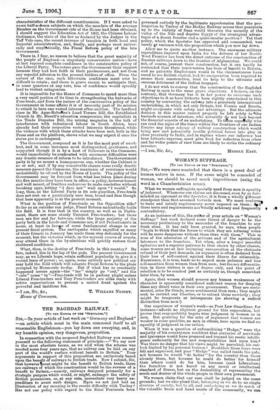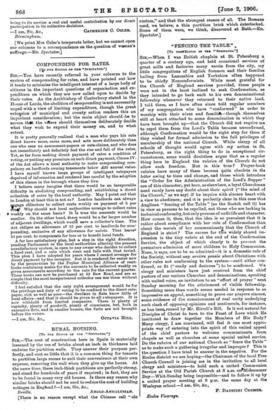WOMAN'S SUFFRAGE. [To THE EDITOR Or THR " SPILVTATOR." . 1 Sin,—We
were once reminded that there is a great deal of human nature in man. If the same might be conceded of woman, we should be saved much impertinence (using the word in a Chamberlainian sense).
What we women suffragists specially need from men is equality of judgment. Whenever our claims are discussed, even by so fair- minded an opponent as the Spectator, it is from a wholly different standpoint than that assumed towards men. We must conforms to tests and satisfy requirements never imposed on them ; 4pdy these tests and requirements are Wholly arbitrary and frequently contradictory.
As an instance of this, the xriter of your article on " Woman's Suffrage" last week declares some threat of danger to be the necessary preliminary to the surrender of the franchise to any fresh class. It has only been granted, he says, when people " begin to think that the forces to which they are refusing votes will be more dangerous without them than with them." This is true of the admission of the artisans and of the agricultural labourers to the franchise. Yet when, after a longer peaceful agitation and a superior patience to that shown by other classes, some women are at last betraying exasperation at the obstinate refusal of their just demands, an argument is often deduced from their loss of self-control against their fitness for citizenship. Experience, it is true, leads us to expect more patience and less self-assertion from women than from men ; but the sex differentia- tion in these virtues is one of degree only, and the point of rebellion is to be reached just as certainly as, though somewhat later than, by men.
Again, that women should possess any human weaknesses of character is apparently considered sufficient reason for denying them any direct voice in their own government. They are senti- mental, cries Sir Oracle, more sentimental than men ; they might seek to restrict our liberties, or to extend them unwisely • they might be temperate or intemperate (so showing a Adieal distinction from men!) Our experience of women's work—as Poor Law Guardians, for instance—affords no slightest ground for this supposition, but proves that responsibility begets wise judgment in women as in men. But granting for the sake of argument that women are weaker in some qualities, as men in others, hero again we find no equality of judgment in our critics.
When it was a question of enfranchising "Hodge," were the majority of his countrymen confident that centuries of servitude and ignorance would have prepared and trained his rustic intelli- gence sufficiently for the new responsibilities laid upon him ? Was there no danger that his views might be parochial, his out- look limited by his personal horizon ? Doubtless these fears were felt and expressed, and poor "Hodge" was called inside the pale, not because he would "do better" for the country than those already there, but because he could do better for himself than others could do for him, because (said Liberalism) the franchise is not based on any moral or intellectual standard of fitness, but on the desirability of representing the needs and desires of the whole people in their own government.
We women claim that our case shall be judged on the same grounds; but we also plead that, belonging as we do to no single stratum of society, but to all, and embodying as we do much of the valuable brain and hand assets of the community, 'we' Can
•
• bring to its service a real and useful contribution by our direct participation in its collective decisions.
Birmingham.
[We print Mrs. Oslees temperate letter, but we cannot open our columns to a correspondence on the question of woman's suffrage.—ED. Spectator.]







































 Previous page
Previous page